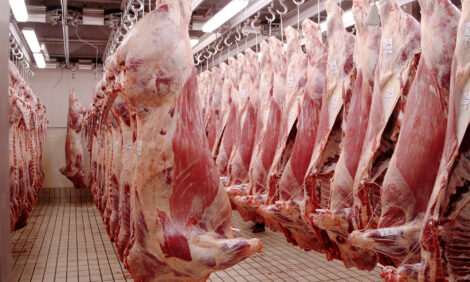



Cattle Farmers Beef up Savings to Prepare for Droughts
AUSTRALIA - Recent high cattle prices have enabled Australian beef producers to put more money into Farm Management Deposits (FMDs).ABC Online reports that their contributions have increased by 50 per cent in the last three years, which is double the increase seen in other sectors.
Almost $7 billion is now held in FMDs, which is the Government's only real drought policy.
FMDs are run through the Australian Taxation Office and allow primary producers to set aside tax-deductible deposits of up to $800,000 during prosperous years, which they can draw upon when times are tough.
Beef's big FMD savings
Khan Horne, the agribusiness general manager at the National Bank of Australia, said the increase in FMD contributions came off the back of strong beef prices and invariably good seasons over the last few years.
"Commodity prices for beef are second to none I've seen in the last decade," Mr Horne said.
"People made money.
"From June, 2014 to June, 2017 beef's gone up from $463 million to $925 million in FMDs. That's a massive increase, and that's excluding producers who identify themselves as being sheep and beef and beef and grain producers."
The overall number of FMD account holders has also risen from almost 6,000 to 8,800 in the same three year period.
Overall, FMD funds have grown 17 per cent year on year.
Back in 2016 the Federal Government doubled the cap for FMD funds from $400,000 to $800,000 per account holder.
Farmers can access these funds during drought if they have held an FMD for longer than six months, and can prove their property has had deficient rainfall for six consecutive months.
"The incredible growth in FMD savings shows that farmers are planning ahead to manage their cashflow in challenging years by putting aside FMDs when they can," Mr Horne said.
"FMDs are used as one of a number of tools in the approach to tax management, cashflow management and of course having their own buffer against challenges.
"You can be aware and educated on the benefits of FMDs, but unless you've got surplus income off a good season or commodity prices or a combination of both, you won't be in a position to [contribute]," he said.
Mr Horne said he expected to see the trend continue until the end of this financial year.
"But I think we will see a withdrawal from them [FMDs] post-June," he said.
Mr Horne said he expects this reduction in contributions will occur as producers around the country face harsh, dry conditions in areas such as Victoria's East Gippsland region, and New South Wales' central-west.
Preparing for lean times
Margo Andrae, the CEO of Cattle Council of Australia, said her industry had learnt to look ahead to those tough times.
"I think it's a simple fact that our industry is so susceptible to so many factors. Over the years we've seen droughts, storms, and a lack of being able to employ good staff," she said.
"We've just become more prepared. No matter what it is, we've recognised as an industry that being prepared just sets us up better for the future.
"From season to season, you just don't know."
Ms Andrae pointed to Western Australian producers who were affected by the destructive cyclones that hit the north-west of the state earlier this year.
"That wipes them out. It wipes out their livestock or all their farm infrastructure. You can't predict that," she said.
"Just having this safety net is so important.
"I travelled through NSW just last week and it's so dry and producers are destocking completely or they're handfeeding their livestock."
Ms Andrae said it was hard to watch farmers struggle to find extra money to keep their businesses afloat.
"The money is spent before they get out of bed because they need to feed those animals," she said.
"Even though it has been a positive market over the last few years, it's not far from everyone's mind how quickly that can change."
TheCattleSite News Desk


